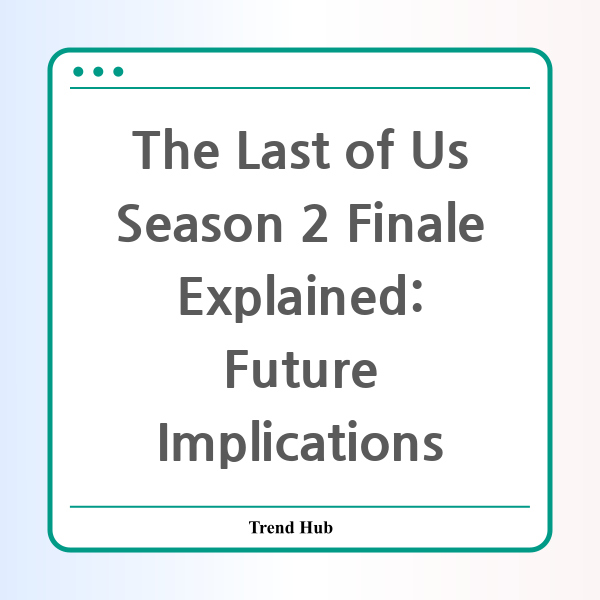* This website participates in the Amazon Affiliate Program and earns from qualifying purchases.

What’s next for The Last of Us after its shocking Season 2 finale?
The gripping conclusion of The Last of Us Season 2 left viewers on the edge of their seats, with a masterfully executed cliffhanger that not only tests the characters’ morality but also hints at a transformative direction for the storyline. As fans digest the intense moments from the finale, it’s essential to explore the implications these events hold for the future of the beloved series.
The second season builds upon the themes of revenge, trauma, and the complex relationships between its central characters, Joel, Ellie, and Abby. These conflicts have escalated over the episodes, culminating in a fierce showdown that could change the course of the narrative. The finale takes place during Day 3 of Dina and Ellie’s stay in Seattle, intensifying the stakes and emotional turmoil for Ellie, who is on a quest for retribution.
In a dramatic turn of events, Ellie confronts Abby’s allies, Owen and Mel, which leads to devastating consequences. As Ellie grapples with the brutal realities of her choices, she inadvertently triggers a cycle of violence that seems almost inescapable. Despite her desire to spare Mel, the situation spirals out of control, resulting in a tragic ending that leaves viewers questioning Ellie’s moral compass.
Then, just when it seems Ellie has reached a breaking point, Abby arrives, leading to a heart-stopping face-off that culminates in a shocking twist. The cliffhanger culminates with Abby aiming her gun at Ellie, leaving viewers in suspense as to whether Ellie survives this deadly encounter. The series co-creator hints at a more traditional cliffhanger approach, ensuring that anticipation for the next season is at an all-time high.
This cliffhanger not only raises questions about Ellie’s fate but also signals a significant narrative shift. The original game storyline suggests a pivot from Ellie’s perspective to explore Abby’s journey, offering a fresh lens through which to understand the complexities surrounding revenge and survival. The potential for Abby’s character to elicit empathy and challenge viewers’ perceptions is a bold move that adds depth to the storytelling.
However, the transition also comes with its challenges. The reception of Abby in the gaming community was mixed, resulting in her character receiving substantial criticism. The showrunners are aware of the potential backlash and are carefully navigating the narrative to foster understanding and compassion for Abby’s perspective. This thematic complexity is essential for the series, as it mirrors real-world conflicts where no character is entirely good or evil.
The creators aim to maintain a balance, providing viewers with a rich narrative that provokes thought and discussion long after the credits roll. As they plan for future seasons, the storyline will likely delve deeper into Abby’s past, revealing how her experiences shaped her decisions and motivations, and eventually bringing her and Ellie’s paths back together.
Given the ambitious scale of The Last of Us, it appears that one more season may not suffice to wrap up the story adequately. The creators have suggested that there may be a fourth season necessary to comprehensively finish the narrative arc. This approach reflects a commitment to thoughtful storytelling that honors the source material while pushing boundaries in character development.
As we await the next installment of The Last of Us, the finale’s emotional depth and cliffhanger serve as a reminder of the powerful stories that resonate not just within the realm of entertainment but also within our understanding of humanity.
Will Ellie find a way to break the cycle of violence? How will viewers respond to Abby’s evolving character? Only time will tell, but one thing is certain: the journey is far from over.
* This website participates in the Amazon Affiliate Program and earns from qualifying purchases.